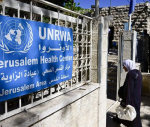You are here
Iraq works to ease tensions after mosque attack kills 70
By AFP - Aug 23,2014 - Last updated at Aug 23,2014

BAGHDAD — Iraqi officials worked Saturday to calm soaring tensions after 70 people were gunned down at a Sunni mosque, as bombings in Baghdad and the north killed over two dozen more.
The attack at the mosque in Diyala province the day before, which most accounts said was the work of Shiite militiamen, threatens to increase anger among Iraq’s Sunni Muslim minority with the Shiite-led government at a time when an anti-militant drive depends on their cooperation.
The violence came as the US, which is carrying out air strikes in Iraq against Islamic State (IS) jihadists, ramped up its rhetoric over the grisly killing of journalist James Foley by the group and shown in a video posted online.
Deputy National Security Adviser Ben Rhodes said Foley’s beheading “represents a terrorist attack against our country”.
On Saturday, Iraq’s Sunni parliament speaker sought to calm sectarian tensions stirred by the mosque attack.
Salim Al Juburi called for political unity and said “the main aim [of the mosque attack] is to foil all the efforts that have been made to form a government”.
“All the political entities condemned the crime, all of them expressed their anger about what happened,” he said in televised remarks.
“Now we are waiting for practical measures to hold the criminals accountable.”
Call to close ranks
Premier-designate Haidar Al Abadi, a Shiite, has condemned the attack and called for “citizens to close ranks to deny the opportunity to the enemies of Iraq who are trying to provoke strife”.
Rights group Amnesty International called Friday’s attack a “massacre”, and said Iraqi authorities “must properly investigate”.
Army and police officers said the attack on the Musab Bin Omair Mosque in Diyala came after Shiite militiamen were killed in clashes, while other sources said it followed a roadside bomb near one of their patrols.
Doctors and the officers put the toll from the attack, in which worshippers were sprayed with machinegun fire, at 70 dead and 20 wounded.
Two officers earlier blamed IS for the attack, but most accounts pointed to Shiite militiamen.
The interior ministry announced an investigation into the attack, which it said was carried out by two men on a motorbike following a bombing targeting security and volunteer forces in the area.
The government turned to militiamen to bolster its flagging forces during an IS-led offensive that has overrun large areas of five provinces since June, but in doing so has encouraged a resurgence of groups involved in brutal sectarian killings in past years.
Ibrahim Aziz Ali, whose 25-year-old nephew was among those killed Friday, told AFP he saw five vehicles with images of Imam Hussein, one of the most revered figures in Shiite Islam, parked at the mosque.
When he and other residents could finally enter, “we found a massacre”, Ali said.
New violence
As officials sought to limit the fallout from the mosque attack, bombings in Baghdad and two northern cities killed at least 27 people and wounded more than 150, officials said.
Three car bombs exploded in the northern city of Kirkuk, killing 21 people, while six more died when a suicide bomber detonated an explosives-rigged vehicle at the entrance to the interior ministry’s intelligence headquarters in Baghdad.
Another car bombing wounded three people in Kurdish regional capital Erbil, a rare attack in a city usually spared the deadly violence that plagues other areas of Iraq.
The United Nations, meanwhile, warned Saturday that the Shiite Turkmen-majority Iraqi town of Amerli is under threat of a “massacre” by jihadists who have besieged it for more than two months.
“The situation of the people in Amerli is desperate and demands immediate action to prevent the possible massacre of its citizens,” UN Iraq envoy Nickolay Mladenov said in a statement.
Abadi and Iraq’s top Shiite cleric, Grand Ayatollah Ali Al Sistani, both also called for efforts to help Amerli.
The United States launched an air campaign against IS in Iraq on April 8, and has since carried out more than 90 strikes that have largely been in support of Kurdish forces in the north, drawing calls for operations elsewhere in the country.
America’s top military officer has said that anti-IS operations in Syria may also be needed.
Foley’s killing has stoked Western fears that territory seized by the militants in Syria and Iraq could become a launchpad for a new round of global terror attacks.
The 40-year-old freelance journalist was kidnapped in northern Syria in November 2012.
In the execution video, released online, a black-clad militant said Foley was killed to avenge US air strikes against IS.
The man, speaking with a clear south London accent, paraded a second US reporter, Steven Sotloff, in front of the camera and said he too would die if Washington kept up its attacks.
Related Articles
BAGHDAD — Iraq's parliament suspended its meeting on Tuesday amid protests by Sunni Muslim MPs over violence that targeted their community i
BAGHDAD — Gunmen shot dead two Iraqi journalists on Tuesday in Diyala, a province where Baghdad declared victory a year ago but which is sti
A suicide car bomb killed 12 Shiite militiamen and Iraqi soldiers Monday in a town north of Baghdad, authorities said, sparking a battle between security forces and fighters with the extremist Islamic State group.















